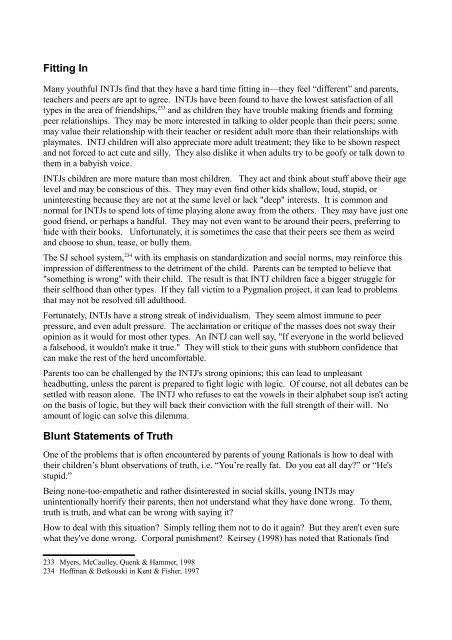Create successful ePaper yourself
Turn your PDF publications into a flip-book with our unique Google optimized e-Paper software.
Fitting In<br />
Many youthful INTJs find that they have a hard time fitting in—they feel “different” and parents,<br />
teachers and peers are apt to agree. INTJs have been found to have the lowest satisfaction of all<br />
types in the area of friendships, 233 and as children they have trouble making friends and forming<br />
peer relationships. They may be more interested in talking to older people than their peers; some<br />
may value their relationship with their teacher or resident adult more than their relationships with<br />
playmates. INTJ children will also appreciate more adult treatment; they like to be shown respect<br />
and not forced to act cute and silly. They also dislike it when adults try to be goofy or talk down to<br />
them in a babyish voice.<br />
INTJs children are more mature than most children. They act and think about stuff above their age<br />
level and may be conscious of this. They may even find other kids shallow, loud, stupid, or<br />
uninteresting because they are not at the same level or lack "deep" interests. It is common and<br />
normal for INTJs to spend lots of time playing alone away from the others. They may have just one<br />
good friend, or perhaps a handful. They may not even want to be around their peers, preferring to<br />
hide with their books. Unfortunately, it is sometimes the case that their peers see them as weird<br />
and choose to shun, tease, or bully them.<br />
The SJ school system, 234 with its emphasis on standardization and social norms, may reinforce this<br />
impression of differentness to the detriment of the child. Parents can be tempted to believe that<br />
"something is wrong" with their child. The result is that INTJ children face a bigger struggle for<br />
their selfhood than other types. If they fall victim to a Pygmalion project, it can lead to problems<br />
that may not be resolved till adulthood.<br />
Fortunately, INTJs have a strong streak of individualism. They seem almost immune to peer<br />
pressure, and even adult pressure. The acclamation or critique of the masses does not sway their<br />
opinion as it would for most other types. An INTJ can well say, "If everyone in the world believed<br />
a falsehood, it wouldn't make it true." They will stick to their guns with stubborn confidence that<br />
can make the rest of the herd uncomfortable.<br />
Parents too can be challenged by the INTJ's strong opinions; this can lead to unpleasant<br />
headbutting, unless the parent is prepared to fight logic with logic. Of course, not all debates can be<br />
settled with reason alone. The INTJ who refuses to eat the vowels in their alphabet soup isn't acting<br />
on the basis of logic, but they will back their conviction with the full strength of their will. No<br />
amount of logic can solve this dilemma.<br />
Blunt Statements of Truth<br />
One of the problems that is often encountered by parents of young Rationals is how to deal with<br />
their children’s blunt observations of truth, i.e. “You’re really fat. Do you eat all day?” or “He's<br />
stupid.”<br />
Being none-too-empathetic and rather disinterested in social skills, young INTJs may<br />
unintentionally horrify their parents, then not understand what they have done wrong. To them,<br />
truth is truth, and what can be wrong with saying it?<br />
How to deal with this situation? Simply telling them not to do it again? But they aren't even sure<br />
what they've done wrong. Corporal punishment? Keirsey (1998) has noted that Rationals find<br />
233 Myers, McCaulley, Quenk & Hammer, 1998<br />
234 Hoffman & Betkouski in Kent & Fisher, 1997




